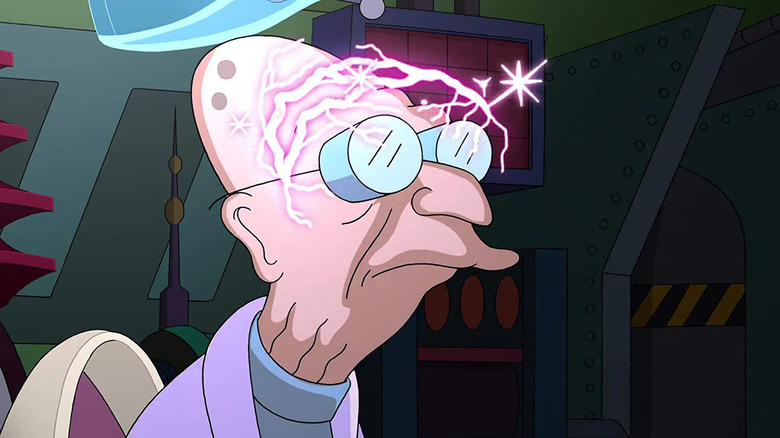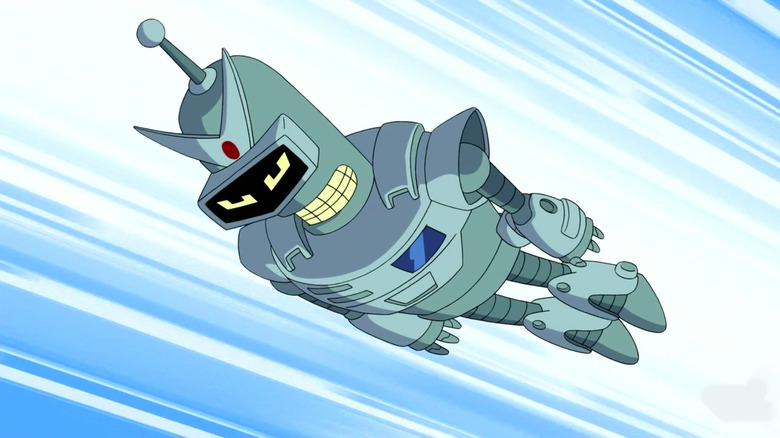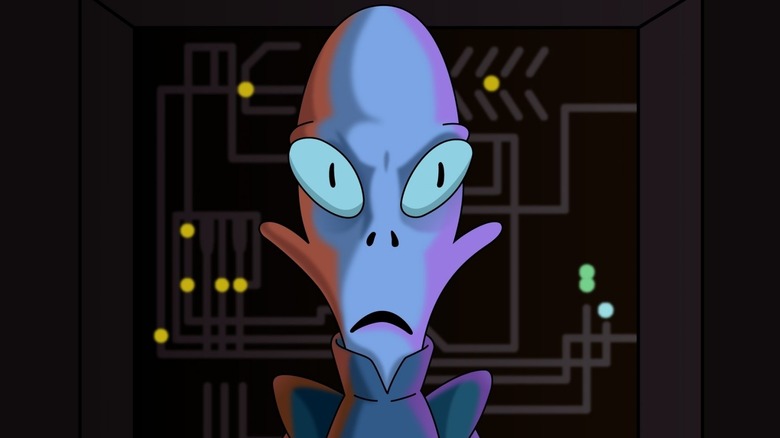Futurama Relied On The Fans To Keep Its Canon Straight
While the notion of presenting multiple, independent stories as sharing a larger, interconnected super-narrative is a conceit that goes back at least as far as Homer, modern sci-fi nerds can credit modern notions of "canon" to Trekkies and to Whovians in the 1960s. The notion that fictional characters were having adventures outside of what was depicted on screen — that is: canon, but in a pop media context — began with "Star Trek." Since then, much of sci-fi TV has endeavored to keep canon an active part of its writing with creators paying close attention to characters' personal histories, the way fictional technologies work, and the like. Even early "Star Trek" struggled to make it to that point, however, and those who pay attention will quickly find continuity errors with Stardates, with terminology (Spock is ... "Vulcanian?"), and with tech.
It didn't take long before intellectual nerds (a term used affectionately) began applying scientific rigor to keeping track of "Star Trek's" minutiae. It took the showrunners a few years to catch up to its own fans, and by the 1990s, Trek was sure to pay close attention to its technical details, even going so far as to publish a technical manual of how the Enterprise operated.
Given that Matt Groening's and David X. Cohen's "Futurama" was staffed entirely by nerdy eggheads — a fact they're proud of: there are multiple PhDs, Masters, and over 50 years at Harvard among them — nerdy, scientific attention to detail was a natural and expected part of the writing process. And while some of the technicals could be grasped by the writers, some of the more minute fineries of the show, Cohen admits to leaving in the hands of fans. In an interview with Wired's "Geek's Guide to the Galaxy," Cohen said as much explicitly.
To the Futurama wiki!
While online fan wikis can be a good source of information, they are not run or curated by the makers of the property they are detailing. As such, one must take some of the information on any wiki (including Wikipedia) with a grain of salt, understanding that it may not be wholly accurate. But when it comes to obsessive, nerdy details, they are certainly a fun way to while away an afternoon. If you've ever wanted to know the history of Chewbacca's son, or the source of a sonic screwdriver, a fan wiki will have your back.
Cohen knows this, and admits that fans kept better track of minutiae than he. One-off, jokey, side characters weren't retained in the memories of the writers, but were indeed memorialized online. Says Cohen:
"We often consult fan wiki pages, where they have compiled all the appearances of various characters, and make sure we have not done what we're going to do. There are many fans that have a better memory of the show than us."
Given the overwhelming number of characters, alien species, robots, planets, and technologies on "Futurama," cataloguing it would be a full-time job unto itself. Thankfully for Cohen, fan obsession did the work for him. When was the last time we caw Crater Face? Or the sleazy chameleon? What year did Amy Wong graduate from Mars University? How many episodes was Randy in? Quickly! To the wiki!
Story rules all
For Cohen, and for the "Futurama" writers, keeping track of stories was more important than keeping track of side characters, and, on the Wired podcast, describes how he and another one of the show's prolific writers, kept track of it all:
"Patric Verrone — who is the only writer other than me who worked on every episode, including all of the DVDs — would keep a little page for each episode we had ever done with a picture and a list of guest stars and the air date. We would arrange these on the upper edge of the wall around the room and while we were pitching out new ideas, we'd always be pointing to things and going, 'It has to be different from episode 408 over there.'"
This is a clever, handy visual aid for writers, no doubt, and would give people an explicit visual to rely on when it came to coming up with original notions — few things are more annoying than when a show repeats itself a little too closely. Of course, pinning paper to the walls eventually ran into a new practical concern: What happens if the show gets unexpectedly renewed? Which has happened multiple times with "Futurama."
"Over the years, you would get used to where everything was and you'd start pointing without looking. After Comedy Central picked us up, there would've been ninety-eight episodes wrapped very neatly around the walls, and then when they renewed us again for twenty-six episodes, Patric printed them out and shaved them down so that 124 could fit in the same spot."
Verrone will have to shave even more next year. "Futurama" is retuning again, this time to Hulu, in 2023. May the writers be reduced to typing in a smaller-point font.


